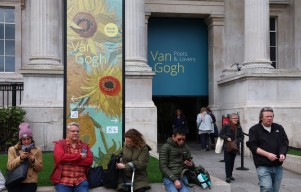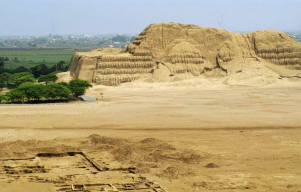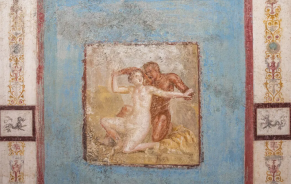(Photo: Wikimedia / Musée d'Orsay)
In a dramatic protest, a climate activist defaced Claude Monet's beloved painting "The Poppy Field" at the Musée d'Orsay in Paris on Saturday. The woman, who attached an adhesive poster to the artwork, said she intended to spotlight the urgent need for action on climate change. She was arrested soon after the incident.
The Protest
The activist is part of Riposte Alimentaire (Food Response), a group dedicated to environmental causes and advocating sustainable food production. Riposte Alimentaire is known for provocative protests targeting museums across Europe. Just last month, they made headlines with a demonstration at the Louvre.
A video shared on social media platform X (formerly Twitter) shows the activist placing a piece of painted cloth depicting a desolate red landscape over Monet's 1873 painting." She declared, "This nightmarish image awaits us if no alternative is put in place," emphasizing the bleak future she believes will come if climate change is not addressed.
Climate change activist VANDALIZES priceless Claude Monet painting in Paris.
— Oli London (@OliLondonTV) June 1, 2024
The activist stuck a piece of painted cloth over ‘The Poppy Field’ painting at the Orsay Museum in Paris demanding climate change action. pic.twitter.com/DXFVhRkdJf
The Artwork
Monet's "The Poppy Field" is a celebrated example of French Impressionism. It is known for its vibrant depiction of people strolling through a lush, blooming field of poppies. The painting's peaceful, idyllic scene sharply contrasts with the activist's apocalyptic message. Unlike the heavily protected "Mona Lisa," Monet's painting was not behind glass, exposing it to potential damage.
Public Reaction
The vandalism sparked an outcry from art lovers and the general public. Many condemned the act as an attack on cultural heritage, arguing that such tactics are counterproductive and alienate potential allies. However, some sympathized with the activist's urgency, acknowledging that the climate crisis requires immediate and dramatic action.
Also Read: 5 Designing Tips for the Ideal Yoga Room and Meditation Space at Home
Museum officials have not yet detailed the extent of the damage or the steps required for restoration. In a statement, the Musée d'Orsay denounced the vandalism, reiterating their commitment to preserving cultural heritage. At the same time, they acknowledged the critical importance of addressing climate change.
Broader Context
Riposte Alimentaire's actions are part of a growing trend among climate activists who target cultural landmarks to draw attention to their cause. This strategy has received mixed reactions. Some view it as a powerful way to raise awareness, while others see it as a misguided approach that risks losing public support.
To be more specific, the group's direction is to provide a healthy diet while stressing the effects of agriculture on the ecosystem. Through these highly publicized protests, Riposte Alimentaire seeks to challenge the current paradigm, intending to prompt drastic changes in climatic policies and, more importantly, the conduct of the population.
In today's world where climate change and its effects are increasingly becoming more pronounced, such acts not only depict the need to keep and maintain art work such as "The Poppy Field" by Monet, but also the need for more and urgent, positive change in the impacts on the environment. The methods employed by activists like those in Riposte Alimentaire are polarizing. Still, they underscore a critical message: Social change on an enormous scale is required to prevent the impending environmental disaster.
Like most museums, the Musée d'Orsay has been tasked with preserving beautiful art and being an active member of the global discussion of solutions to sustainability dilemmas. It became clear that these and similar incidents are a strong reminder of the need to address and solve the problem and explore ways of combining justice for our climate and the significance of our cultural legacy.
Related Article: John Lennon's 'Help!' Guitar Sets New Record With $2.9 Million Auction Sale


















